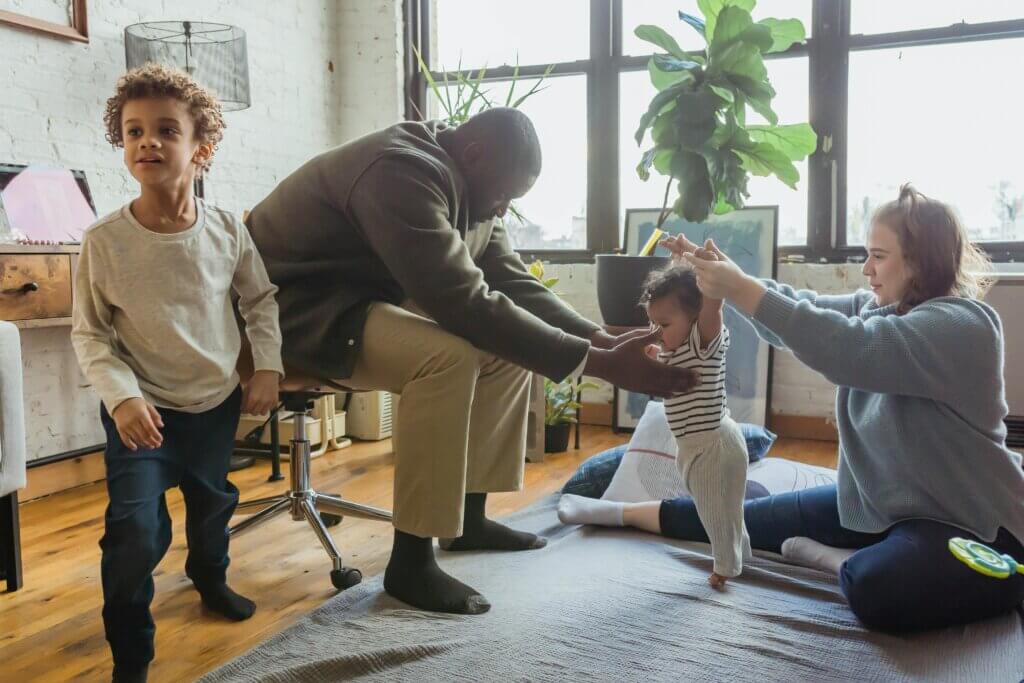FAQs for Parents and Families
FAQs for Parents and Families
What do you mean by "family"?
We primarily use the terms “parent” and “family” throughout this site. We believe “family” is whoever you say it is – and whatever your role in the family, you are important. The term “parent” will resonate with some and may not feel like it fits for others. Please know we mean it inclusively. It is everyone who is doing the important work of loving, nurturing, and caring for children – which includes all types of aunties, grandpas, caregivers, family friends, and more.
What happens during a home visit?
 Home visits are usually about an hour, and usually are at your home. But sometimes we might meet up in a park, or another place that feels comfortable for you. What we talk about and what we do on the home visits is really led by you.
Home visits are usually about an hour, and usually are at your home. But sometimes we might meet up in a park, or another place that feels comfortable for you. What we talk about and what we do on the home visits is really led by you.
We’ll start with your observations, your expertise, your curiosities, and your questions.
While I might come with expertise in parent-child relationships, you are the expert on your family. You’re with them constantly, seeing every little change in your child. And we’ll build off of that expertise – the things you notice and the things you are curious about! If you have questions about when your baby will smile or laugh, we’ll talk about that! If you’re worried about your baby starting to crawl and what they will put in their mouths, we’ll talk about that!
If you’re having a hard day, we’ll sit with you in that moment.
Many parents in HFA have experienced, or are currently experiencing, high levels of stress. Sometimes the stress comes from lacking access to basic needs, like adaquate food, clothing, a place to live. Sometimes, the stress comes from other relationships in your life. Sometimes, there are critical health needs or concerns. Sometimes, the stress comes from just being a new parent and not having anyone to support you. You’re not alone. If and when you experience those things, sometimes we’ll need to just focus on that during our time together. And if there are things we can do to support you – getting you connected to a community resource, helping you problem solve, we’ll do that!
We’ll focus on the relationships between you and your children.
One of the most important things we’ll do with you and your family is observe and respond to the interactions between you and your child. All of the little moments between you both add up over time and tell us about the quality of the relationship that is developing. We will support you in building a nurturing relationship with your child—the kind of relationship that makes a child feel safe and comforted.
We’ll support the dreams and goals you have for your family.
With this new (or-soon-to-be-new) addition to your family, you probably have some ideas about the kind of parent you want to be, the kind of family culture you want to create, and the kind of life you’ll all live together. We can’t wait to hear what you’re dreaming about, and we’re here to support you on your journey – wherever YOU decide that will lead.
How do I get connected to HFA where I live?
You’ll want to start with our map, and find the HFA program closest to you, and reach out to them directly.
HFA programs come in many sizes – some are able to partner with 20 families a year, and some can partner with hundreds of families a year. Some also have criteria for which families are able to participate. So, you’ll want to reach out directly to your local HFA program and see if they have an opening. They’ll be happy and excited to hear from you!
How often can I expect to have a Family Support Specialist come to see me?
Typically, we’ll start with weekly visits. When you’re preparing for birth, or in those early days after the baby has arrived, so much happens so fast! Things will change day by day with you and your baby. As time goes on, we will probably find that you don’t need us to come weekly anymore, and we’ll come less frequently, every-other-week, or every month.
